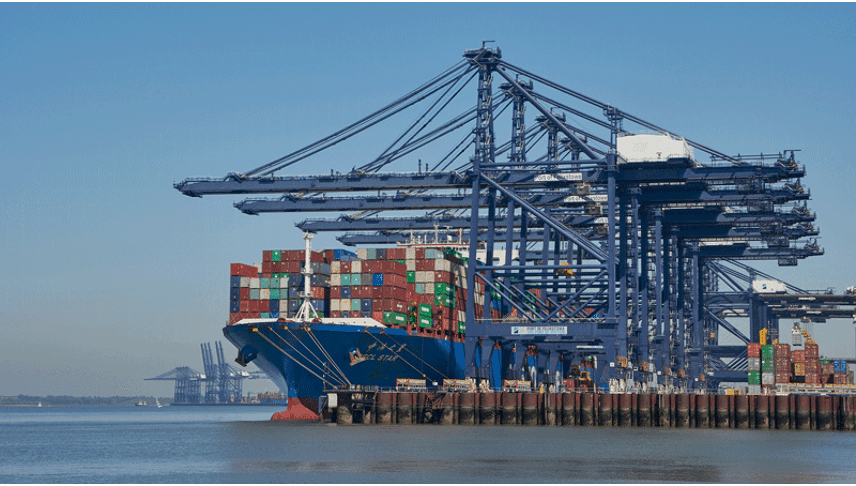Register for free and continue reading
Join our growing army of changemakers and get unlimited access to our premium content

Pictured: The Port of Felixstowe, the UK's largest port
The call to action is from the Transport Committee, which has today (20 March) published a report assessing the next steps for the Maritime 2050 Strategy. The Strategy was published in 2019, shortly after the UK Government enshrined its net-zero target in law.
While the long-term vision of the Strategy has been praised, the Committee is concerned that, in the years since its publication, little has been done to support long-term aims with clear actions to be taken in the near-term and medium-term. This includes the 2050 net-zero target for the sector.
While investors do need long-term visions when vessels and infrastructure are typically built with lifespans of 30 years, the report states, they also need clarity on exactly which technologies they should be backing and when. It calls the Maritime 2050 Strategy’s climate approach “a muddle”.
The Committee is, therefore, urging the Department for Transport (DfT) to avoid any further delay to its promised climate-related follow-up to its publications in 2019. The Maritime Strategy was notably supported by a Clean Maritime Plan, stating that all new vessels ordered for use in UK waters will have zero-emission propulsion capability by 2025. In a follow-up, the Committee wants more information on the creation of clean maritime ‘clusters’ over the next two years, including details of which technologies they will focus on.
The Committee also expresses, in its new report, concern that the Government is focusing too heavily on R&D funding for technologies that either don’t exist yet or are in their infancy, and not enough on scaling up mature technologies. These include shoreside electrical power supplies and chargers. The report argues that ports may be unable to fund these mature technologies at the scale and pace needed themselves, making the case for more public support.
While the Government has this year promised some match funding for ‘shore power’, the Committee has heard from the industry that this commitment is unlikely to go far enough.
The report emphasises that the Government has stated a wish to be a world leader in clean shipping but that, since 2019, other markets have been bringing forward more clear and immediate measures to encourage investment in low-carbon maritime technologies. This includes China, the EU and the US. The report emphasises how decarbonising the maritime sector presents a global financial opportunity, as well as an opportunity to revitalise port and coastal communities, contributing to the levelling up agenda.
Transport Committee Chair Iain Stewart, the Conservative MP for Milton Keynes South, said: “All the evidence we received about the UK’s maritime sector has shown it is resilient, entrepreneurial, and used to working independently from government. Nonetheless, there is an array of things government should do to support the sector and help it achieve its ambitions to decarbonise and remain a positive force on the world stage and for the UK economy. We commend the Government for being forward thinking in developing the Maritime 2050 strategy, but clarity and focus are needed to refine its muddle of 184 recommendations.
“The sector will need sustained support to overcome the challenge of radically cutting carbon emissions. We urge ministers to bring forward the promised Clean Maritime Plan, which will give industry the certainty it needs to invest in technology, new vessels, infrastructure and low-carbon shore power. Without it, we will fall behind other countries and miss our net-zero targets.”
Earlier this year, the Committee made a similar request for Ministers to clarify decarbonisation technology pathways for other hard-to-abate transport sectors, including aviation and heavy-duty road transport.
Worker treatment and skills
As well as decarbonisation, the Committee’s new report recommends that the Government goes further and faster to ensure that the British maritime sector is socially sustainable, with positive impacts on people and the economy that are more fairly shared.
Experts told the Committee that the maritime sector is struggling to recruit and retain younger workers, especially women and those from minority ethnic backgrounds. Some 96% of seafarers are men. They also expressed concern that the sector has become less attractive to young workers following the P&O scandal, in which the business sacked more than 700 seafarers in March 2022.
The Government has intervened by investigating the P&O case and by enforcing the UK national minimum wage equivalent for all workers on ships that use UK ports 120 times a year or more. The report recommends clarity on where responsibility for enforcing this requirement lies, stating that ports may not be the appropriate enforcers.
“Ports authorities cannot be used as the Government’s ‘Swiss army knife’ to undertake an ever greater variety of tasks without appropriate resourcing and expertise,” the Committee stated. The report also emphasises the importance of ensuring good working conditions beyond just appropriate pay.
More broadly, the report recommends a full review of training funding in the maritime sector, including how training is communicated to students.


Please login or Register to leave a comment.